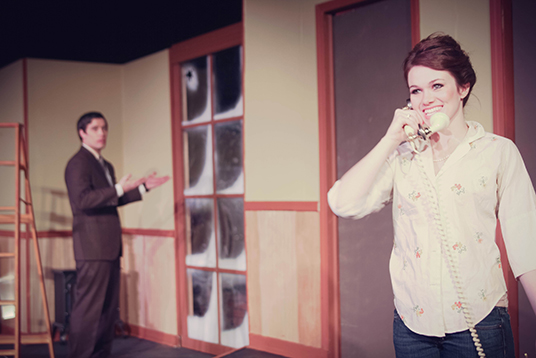Overview
"Being in a school where everybody’s supporting each other no matter who gets the lead, is a great place to grow.
The Dramatic Arts program at Trevecca is designed to prepare students for competitive careers in professional theatre, theatre education or graduate studies in theatre. During their work at Trevecca, dramatic arts majors focus on and explore one or more of the following collaborative facets of theatre: acting, directing, design (scenic, costumes lighting, etc.), playwriting, or stage management.
Students are encouraged to be creators of original stories through playwriting, not merely imitators or interpreters of other creative work in the performing arts. This level of artistic training in theatre better prepares students for solid, independent work among creatives in the industry after graduation. They not only learn critical thinking and scholarship in the discipline, but they also learn how the performing arts can serve their local communities and, where possible, the global community as well. Emphasis in theatre training at Trevecca is placed on what it means to seek a passion for Jesus and have compassion for those with whom one comes into contact on a daily basis.
Learning occurs through hands-on, real-world experiences in each phase of theatre production, both on campus and through off-campus internship experiences. Examples of past local internship placements include Nashville Repertory Theatre, Nashville Children's Theatre, Nashville Shakespeare Festival, Nashville Ballet, Nashville Opera, and Studio Tenn. Additionally, some students do their internships abroad in NYC, LA, or overseas.
The Dramatic Arts Program produces four or five theatre productions for the Trevecca campus and Nashville communities each year. Auditions are open to all students, and students majoring or minoring in the program are required to participate in some aspect of most on-campus productions.
By the time you reach your senior year as a theatre student, you will have begun to specialize in one of these major collaborative areas of theatre and are ready to create and present an original senior project in your specialized area. The project presentation is open to the general public and provides a student with a culminating, professional capstone experience in preparation for either graduate studies and/or professional employment after graduation.
Every student in the program is also strongly encouraged to consider an internship in theatre (required of majors), ideally during their junior year. Including an internship with academic work provides students with valuable opportunities such as professional hands-on experience in the theatre, networking relationships among prospective employers, and building a well-rounded resumé for graduation.
What our students say
"It's an open place to learn. For a theatre major, it is a place to grow as an artist. The communication department has provided me skills and experience beyond my major."
Montgomery Sparrow '15
"I like the attention each professor gives to students as individuals."
Andrea Richardson ‘16
"My experience as a dramatic arts student would not be the same without Jeff Frame. Jeff is by far one of the most kind and loving people that I have come to know. Jeff Frame is a dear friend and professor to me. I have learned a great deal that has been the foundation of the productions that I have been involved in and plan to do. I believe that the Dramatic Arts department has given me the foundation to achieve my dreams of acting, writing, producing, and directing in the church and as a professional artist."
Angelo Tate '13
Faculty
News
Core Classes
Theories of Communication
COM 3010
Surveys the major theories of human communication. The study will focus on the origins, usefulness, and limitations of each theory for understanding communication events. This course will help prepare students to analyze and interpret human communication in all its forms (intrapersonal communication, interpersonal communication, small group transactions, organizational communication, public speaking, drama, and mass communication).
Course Hours: 3
Acting I: Theory and Practice
COM 2410
An introductory workshop course focusing on beginning acting techniques and scene study. Students will explore the actors' instrument and the use of space, relaxation, concentration, imagination, movement, and how to pursue an objective through physical and psychological actions in order to create a character.
Course Hours: 2
Script Analysis
COM 2950
A detailed study of the basic tools and approaches necessary for reading and interpreting stage scripts before directing, acting, or design processes can effectively begin. (All dramatic arts majors and minors, as well as all theatre education majors, must take this course in their freshman or sophomore year, with the exception of transfer students).
Course Hours: 1
Theatre History and Dramatic Literature
COM 3400
A comprehensive survey of representative plays from each period of theatre history, noting the reciprocal effects of production techniques on dramatic forms. Special emphasis is given to cultural and historical factors influencing the rise and fall of new dramatic forms and theatrical practices. It is recommended that students take COM 2950 as a foundation for this course.
Course Hours: 3
Playwriting Workshop
COM 3450
An introduction to basic storytelling and playwriting techniques for stage plays. Students will research and develop scripts for theatre in a workshop climate, with the goal of having two completed, professional or competition-ready scripts by the end of the semester.
Course Hours: 2
Advanced Public Speaking
COM 4000
Gives students practical experience in the preparation and presentation of the speeches that are usually required in business and the professions. Areas of instruction include speech making, oral reading of reports, and speech for radio and television.
Course Hours: 3
Design and Production for the Stage
COM 4030
A hands-on, introductory study of theatrical design and production that will primarily focus on scenic and lighting design and production. Costume design and production will be addressed briefly. In the process, students will practice design, construction, and implementation skills in conjunction with the current drama production as well as through individual project work.
Course Hours: 3
Play Directing
COM 4040
An introductory examination of the directorial process beginning with textual analysis of dramatic action and covering such areas as production unity, stage movement and business, motivational analysis, and pictorial composition. Other areas of emphasis include a brief overview of directing history, types of directing theory and style, planning and rehearsal techniques, and the relationship of the director to other theatre artists. Student work includes selected scene work and directing projects prepared for class presentation culminating in a final scene presentation.
Course Hours: 3
Career Internship in Communication Studies
COM 4510
Intensive study, observation, and participation in various field projects designed and contracted between the student and instructor. Internships will be arranged in conjunction with the student's major. Supervision is coordinated with the Career Services Office. Maximum of 6 hours. Graded S/U.
Course Hours: 1-3
Modern Drama in Performance
ENG 4410
Through a reader-response approach, students will read plays and view live, off-campus performances of plays written by award-winning American and European playwrights of the 20th century. The focus on experimentation with theatrical genres, the artistic development of social critique, and the re-emergence of meta-theatricality invites students to create meaningful connections between the "literariness" of drama, its performance, and audience reception. American playwrights include O'Neill, Odets, Rice, Hellman, Hansberry, Tennessee Williams, and Arthur Miller. European playwrights include Ibsen, Shaw, Chekhov, Pirandello, Lorca, Brecht, and Beckett.
Course Hours: 3
Research Methods in Communications Studies
COM 4550
Introduces students to the most commonly used qualitative and quantitative methods of research associated with the discipline of communication.
Course Hours: 3
Junior/Senior Seminar in Dramatic Arts
COM 4600
A seminar designed specifically for juniors and seniors who are majoring in dramatic arts and theatre education. The seminar's focus is on developing materials (headshots, resumes, portfolios, etc.) essential to a graduate's success in professional theatre, graduate school, and/or teaching in secondary education. For theatre education majors, this course must be completed no later than the semester prior to student teaching.
Course Hours: 1
Senior Project in Communication Studies
COM 4800
All majors in the Department of Communication Studies are required to present a senior project as a public performance. The project should relate to the student's specialized interest in the field, demonstrate his or her acquired skills, and be academically and vocationally beneficial as a culminative experience. The project must be approved by the faculty advisor at least one semester in advance. The number of credits is contingent upon the number of hours given to the project [40+ hours for one (1) credit; 80+ for two (2) credits.] Graded S/U.
Course Hours: 1-2
Overview
"Being in a school where everybody’s supporting each other no matter who gets the lead, is a great place to grow.
The Dramatic Arts program at Trevecca is designed to prepare students for competitive careers in professional theatre, theatre education or graduate studies in theatre. During their work at Trevecca, dramatic arts majors focus on and explore one or more of the following collaborative facets of theatre: acting, directing, design (scenic, costumes lighting, etc.), playwriting, or stage management.
Students are encouraged to be creators of original stories through playwriting, not merely imitators or interpreters of other creative work in the performing arts. This level of artistic training in theatre better prepares students for solid, independent work among creatives in the industry after graduation. They not only learn critical thinking and scholarship in the discipline, but they also learn how the performing arts can serve their local communities and, where possible, the global community as well. Emphasis in theatre training at Trevecca is placed on what it means to seek a passion for Jesus and have compassion for those with whom one comes into contact on a daily basis.
Learning occurs through hands-on, real-world experiences in each phase of theatre production, both on campus and through off-campus internship experiences. Examples of past local internship placements include Nashville Repertory Theatre, Nashville Children's Theatre, Nashville Shakespeare Festival, Nashville Ballet, Nashville Opera, and Studio Tenn. Additionally, some students do their internships abroad in NYC, LA, or overseas.
The Dramatic Arts Program produces four or five theatre productions for the Trevecca campus and Nashville communities each year. Auditions are open to all students, and students majoring or minoring in the program are required to participate in some aspect of most on-campus productions.
By the time you reach your senior year as a theatre student, you will have begun to specialize in one of these major collaborative areas of theatre and are ready to create and present an original senior project in your specialized area. The project presentation is open to the general public and provides a student with a culminating, professional capstone experience in preparation for either graduate studies and/or professional employment after graduation.
Every student in the program is also strongly encouraged to consider an internship in theatre (required of majors), ideally during their junior year. Including an internship with academic work provides students with valuable opportunities such as professional hands-on experience in the theatre, networking relationships among prospective employers, and building a well-rounded resumé for graduation.
What our students say
"It's an open place to learn. For a theatre major, it is a place to grow as an artist. The communication department has provided me skills and experience beyond my major."
Montgomery Sparrow '15
"I like the attention each professor gives to students as individuals."
Andrea Richardson ‘16
"My experience as a dramatic arts student would not be the same without Jeff Frame. Jeff is by far one of the most kind and loving people that I have come to know. Jeff Frame is a dear friend and professor to me. I have learned a great deal that has been the foundation of the productions that I have been involved in and plan to do. I believe that the Dramatic Arts department has given me the foundation to achieve my dreams of acting, writing, producing, and directing in the church and as a professional artist."
Angelo Tate '13


